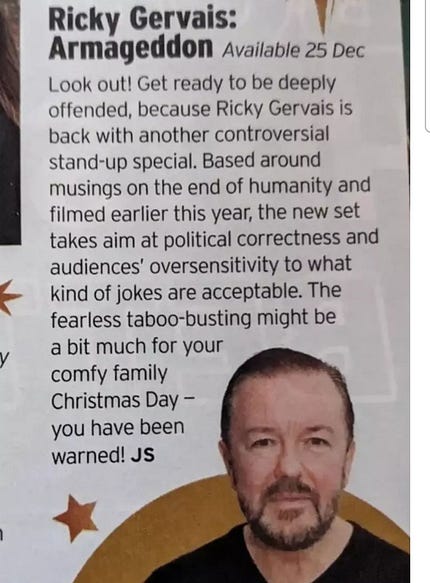"Edgy" Comedians Selling a Conservative Status Quo as Rebellion
Take some real risks, guys!
Hello, readers. Today’s newsletter is a follow-up from yesterday’s.
There’s going to be a paywall about halfway down, which reminds me…
But real quick: here’s the part of the newsletter where I ask you to consider signing up for the free version if you’re new here and ask existing free subscribers to consider upgrading to the paid version.
I was online the other day when I saw this write-up/preview for Ricky Gervais’s new stand-up special on Netflix:

And I was struck by how… generic it is.
That pretty much just describes like… 70-80% of current stand-up comedy specials, right? Oh man, a comedian? Criticizing “political correctness and audiences’ oversensitivity to what kind of jokes are acceptable?” Who has ever heard this before? What a truly original concept!
We’ve all seen these shows before. Walk on stage, spend five minutes hyping up just how edgy you are and about how comedians are really society’s truth-tellers, complain about kids these days with their pronouns, make a joke about identifying as an ape or something like that, head for the exits, and collect your millions of dollars from Netflix while articles about how controversial your show is only increasing its popularity. It’s become a genre.
The cosmic cruelty of success.
There’s a sort of cosmic cruelty that successful comedians endure. For many, their success was built on their ability to relate to the average, everyday person. But as they become more successful, they have less and less in common with the average, everyday person.
Comedian Dana Carvey has a character he does, the ‘Angry East Coast Comic,” who becomes wildly successful but still has to find things to be angry about. Check him out here on Conan O’Brien’s Conan O’Brien Needs a Friend podcast, explaining the character:
So the more successful a comedian becomes, especially comics whose success is built on relatability, the more difficult comedy becomes.
Seinfeld succeeded because comedian Jerry Seinfeld’s comedy was built on an understanding of society that millions of people were able to relate to. His newer material wasn’t getting the kinds of laughs his older material did, and rather than consider that perhaps the issue is that he’s no longer as tuned-in to the world around him, people aren’t laughing for some ulterior reason.
This is the joke that, because it didn’t get as much of a laugh as he was used to with his earlier material, convinced him that political correctness had gone too far:
The people in your life, they’re so important, yeah? Really? They don’t seem very important, not the way you scroll through their names on your contact list like a gay French king. [Makes effete scrolling gesture.] Who pleases me today? Who shall I favor? Who shall I delete?
It’s not a terrible joke; it’s just not a great one. In response to that joke not getting as much applause as he’s become used to, Seinfeld decided that people must have been offended by the “gay French king” line. But that was all him filling in the blanks and reverse-engineering a reason for the joke not getting laughs that had nothing to do with whether or not it was a good joke.
And I think that happens a lot with comics: they will attribute later-in-career failures to people being “too easily offended” when it really, truly may just be that the joke didn’t land as well as he’d hoped.
When this happens to people in other industries, they don’t usually jump to going, “This is political correctness’ fault!”
A band will have success early in their career, fall off a bit on their next record, and never find equivalent success on future albums. It happens to novelists who have a monster debut but fail to recapture the magic in follow-ups. This happens to athletes who may dazzle in their rookie season only to falter as their career goes on. This happens to directors unable to churn out a second hit. The reasons for why later success may be more difficult than earlier ones may vary — it can be declining skill, it can be less of a social understanding, or it can just be luck. What it isn’t, however, is “political correctness.”
But that’s what comedians seem to stick with to explain why people might not find them as funny as they once did. Claiming that the problem is audiences’ political correctness is conspiratorial nonsense. The much simpler answer is just that it wasn’t as good of a joke!
“Edginess” and the selling of the status quo as a form of rebellion.
Comedians love to present themselves as “edgy” and “dangerous,” but a lot of the time, these routines don’t live up to the “prepare to be offended!” billing that the press releases push (and the media gladly run with). And frankly, if I go into something where I’ve received some warning about being offended, I want to be really and truly offended. I want to feel a level of disgust and revulsion I’ve never felt before. I really, truly want to be offended.
But then, I’ll click “play,” and get hit by the tamest snoozefest imaginable. British comedian Jimmy Carr is a great example of this. Last Summer, he posted a video titled, “The Time I Told a 9/11 Joke to a Room Full of Americans…” He prefaces his joke with a 1-minute and 19-second preamble about how edgy and taboo he is.
Great to be with you here this evening. I’ll tell you why it’s great to be here. We’re drinking, my friends, in the Last Chance Saloon. What I’m saying on stage tonight is barely acceptable now. In ten years time, f-ing forget about it. You’re going to be able to tell your grandchildren about seeing this show. You’ll say, “I saw a man, and he stood on stage and made light of serious situations. We used to call them jokes and people would laugh.”
And your grandchildren will ask, they’ll say, “Non-binary elder,” [he pauses here for applause for some reason], non-binary elder, what’s a joke?” And you’ll say, “You are.”
I say you can joke about anything, but not with anyone. I think with you good people this evening, I should be fine, right? Well, let’s see, shall we? We’ll put that to the test…
Okay, so after all of that, we’re finally to the jokes. The dark jokes that more sensitive audiences wouldn’t be able to handle. Prepare to be underwhelmed1:
Having sex is like riding a bike: my uncle taught me when I was a kid… People say the best things in life are free, but those people have clearly never had sex [darts his eyes back and forth for comedic effect]… I like it when the girl puts the condom on for you, but I was asked to leave the pharmacy… My girlfriend doesn’t think that her sister is trustworthy, but believe me, that girl can keep a secret… Is anyone here in a controlling relationship? Raise your partner’s hand… I want One Direction to do a BTS covers medley at my funeral because that way I’ll be glad I’m dead… Now, you might think this is silly, but I assure you it’s absolutely true. When Zayne left One Direction, for me, it was like 9/11: yeah, I didn’t care about that, either…Well, there’s a real generational divide there, I can see. Some people are looking at me like, “9/11, steady on.” Other people are looking at me like, “One Direction, don’t take their name in vain.” … I was actually supposed to be on one of the planes on 9/11, but the more interesting story is how I met Osama.
His 9/11 joke was really just that he… didn’t care? OooOoOOooOh, so edgy! Does he understand how people talk about 9/11 these days on the internet?
On January 1, the version of Mickey Mouse used in Steamboat Willie entered the public domain in the U.S. Within hours, I came across two separate memes photoshopping him into images where he’s carrying out 9/11. “Oh, I didn’t quite care for it,” or whatever, doesn’t compare to what Gen Z is posting these days.


See, in the years of people on the right doing this whole “The left is a bunch of fragile snowflakes who are offended by everything!” nonsense, they eventually started to believe it. Yes, you can find a handful of people on social media who are offended by just about anything. These people have always existed, but they are not representative of some larger whole. They are outliers, but comedians have convinced themselves that these are the average members of whichever generation group they’re trying to insult. The result is lazy writing and weak-sauce jokes that aren’t anywhere near as “forbidden” as the comedians pretend, and stories about how outraged people will be.
Still, because “Oh my god, people are outraged!” is the entire publicity plan for these types of specials as they get released, the “People are trying to cancel so and so. Is his free speech under threat?” promo-narrative gets published, and we end up having dumb, pointless conversations in response to relatively nothing. It’s all part of the publicity plan. No, not everyone will like Chappelle’s or Gervais’s latest show. Some might actually be offended. No, that doesn’t mean we have to reignite the “Is he being canceled? Is criticism of him an attack on free speech?” fire again. None of it is serious. Netflix often already has these comedians signed onto future specials on deals worth tens of millions of dollars.
Keep reading with a 7-day free trial
Subscribe to The Present Age to keep reading this post and get 7 days of free access to the full post archives.


